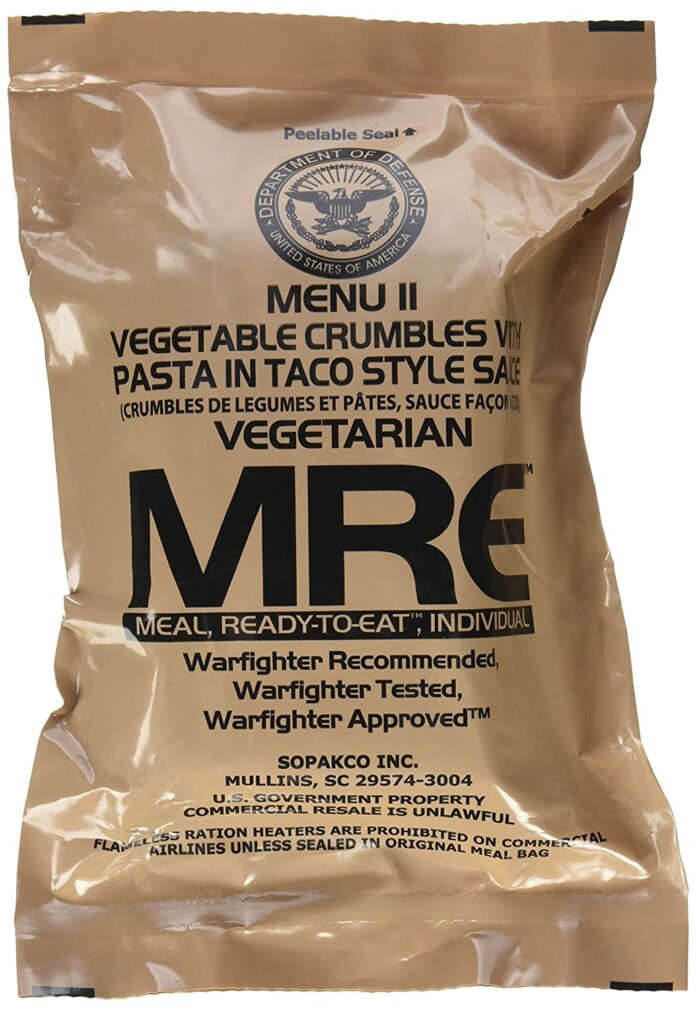Are you ready to live an MRE life if you absolutely have to? Here’s what you need to know about MREs.
The Meal, Ready-to-Eat (MRE) was created by the United States Department of Defense in 1981 to replace canned MCI (Meal, Combat, Individual Rations).
MREs come in lightweight packaging that can withstand severe changes in weather and have a long shelf-life. They are considered to be a complete meal in a bag, making them a popular choice for Preppers looking to stock their pantries, Get Home Bags, and Bug Out Bags.
MREs have been consistently updated based on service members’ needs and preferences as well as advances in technology. Current MREs come with a Flameless Ration Heater (FRH) that allows enjoyment of a hot meal without the need for fire. This makes it pretty appealing to many Preppers planning for years of off-grid living.
Source of Total Nutrition
Each MRE contains 1,200 calories if consumed in full and can be eaten for 21 days straight before nutritional deficiencies occur. There are currently 24 entrees and 150 additional items available in MREs.
MRE meals are specifically recommended for people engaging in an active lifestyle, as they contain high fat and salt contents that are not ideal for sedentary lifestyles.
MREs also lack dietary fiber, which can lead to constipation.
Inside each pack you’ll find:
Main course (often referred to as “the main”)
Side dish
Dessert or snack (typically commercial candy, fortified pastry, first strike bar, or Soldier Fuel Bar)
Crackers or bread
Spread of cheese, peanut butter, or jelly
Powdered beverage mix: fruit-flavored drink, cocoa, instant coffee or tea, sports drink, or dairy shake
Utensils (occasionally it includes a full set – spoon, fork, and knife, but usually just a plastic spoon)
Flameless ration heater (FRH)
Beverage mixing bag
Accessory pack:
Xylitol chewing gum
Water-resistant matchbook
Napkin/toilet paper
Moist towelette
Seasonings, including salt, pepper, sugar, creamer, and/or Tabasco sauce
Freeze-dried coffee powder
Built to Withstand the Elements
View this post on Instagram
The packaging of MREs is what makes them really special. They can withstand freefalls from 98 ft.
They have a minimum shelf life of three and a half years at 81°F, nine months at 100°F, and short durations from −60°F – 120°F. New forms of packaging are being explored, using zein to replace the foil, which can be easily punctured, conducts heat, and is reflective.
Not Winning Flavor Awards
While it may sound like MREs are the perfect food to line your bunker with, they have one major drawback – they are far from delicious.
While they will meet your basic nutritional needs and sustain you as you fight to survive, you probably won’t be looking forward to dinner each night. On a scale of 1-10, expect your MREs to come in somewhere around a 4-5.
If you’re looking for specialty MREs, you can find vegetarian, Kosher/Halal, and shellfish-free options.
Pricey Given the Options
They are pricier since MREs are not always a meal of choice when you have other options to choose from. They typically sell from various companies for $6-12/piece.
On the plus side, you can purchase them in bulk for much less. You can purchase an entire year’s supply of MREs for $3,700-7,500, allowing you to check one big thing off of your Prepper’s list.
MREs may not be the most desirable meal that you’ll crave, but they can last up to five years and contain all of the nutrition you need, making them a Prepper favorite. Learning to live the MRE life when you need it will definitely come in handy.
Where can you buy MREs?
Real Military MREs can be often be bought on ebay, craigslist and other sites. But Commercial for the public mres made and sold by the same manufacturers, just for the public are available at select high end Survival & Prepping sites like Survival Warehouse. Buy MREs here
Have you eaten an MRE before? Let us know your thoughts in the comments section!


